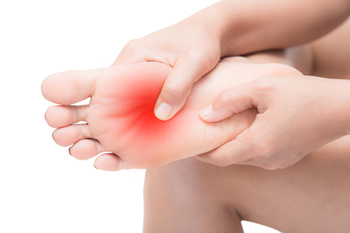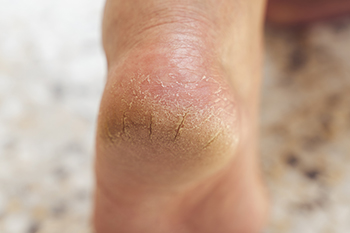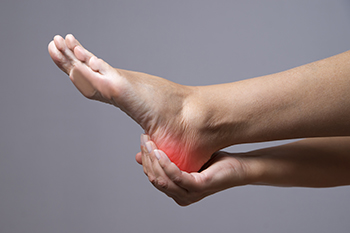Items filtered by date: November 2023
About Peripheral Neuropathy

Peripheral neuropathy, a condition where nerves in the body's extremities like feet are damaged, is especially prevalent in those over 55 years old. This nerve damage can affect sensory, motor, and autonomic nerves, leading to symptoms such as numbness, tingling, pain, muscle weakness, and balance issues. Early consultation with a podiatrist is important for symptoms such as foot pain or wounds that are not healing, especially in people at high risk, including diabetic patients. Diabetes is the most common cause of peripheral neuropathy, where high blood sugar levels damage nerves. Other causes can include physical injuries, viral infections, medication side effects, and excessive alcohol use. Treatment varies based on the cause and symptoms. Untreated peripheral neuropathy can cause serious complications like foot ulcers, infections, gangrene, and even amputation. It can also cause heart and circulation issues. If you have symptoms of peripheral neuropathy, it is strongly suggested that you make an appointment with a podiatrist for an evaluation and treatment.
Neuropathy
Neuropathy can be a potentially serious condition, especially if it is left undiagnosed. If you have any concerns that you may be experiencing nerve loss in your feet, consult with Glenn Aufseeser, DPM from Lakewood Foot and Ankle Specialists. Our doctor will assess your condition and provide you with quality foot and ankle treatment for neuropathy.
What Is Neuropathy?
Neuropathy is a condition that leads to damage to the nerves in the body. Peripheral neuropathy, or neuropathy that affects your peripheral nervous system, usually occurs in the feet. Neuropathy can be triggered by a number of different causes. Such causes include diabetes, infections, cancers, disorders, and toxic substances.
Symptoms of Neuropathy Include:
- Numbness
- Sensation loss
- Prickling and tingling sensations
- Throbbing, freezing, burning pains
- Muscle weakness
Those with diabetes are at serious risk due to being unable to feel an ulcer on their feet. Diabetics usually also suffer from poor blood circulation. This can lead to the wound not healing, infections occurring, and the limb may have to be amputated.
Treatment
To treat neuropathy in the foot, podiatrists will first diagnose the cause of the neuropathy. Figuring out the underlying cause of the neuropathy will allow the podiatrist to prescribe the best treatment, whether it be caused by diabetes, toxic substance exposure, infection, etc. If the nerve has not died, then it’s possible that sensation may be able to return to the foot.
Pain medication may be issued for pain. Electrical nerve stimulation can be used to stimulate nerves. If the neuropathy is caused from pressure on the nerves, then surgery may be necessary.
If you have any questions, please feel free to contact our offices located in Lakewood and Manchester Township, NJ . We offer the newest diagnostic and treatment technologies for all your foot care needs.
Common Reasons Why Cracked Heels Develop

Cracked heels, also known as heel fissures, are a common foot ailment that can be both unsightly and uncomfortable. Several factors contribute to their development. One primary cause is dry skin. The skin on the soles of your feet is naturally thicker, and when it lacks moisture, it becomes less flexible and more prone to cracking. Another factor is inadequate hydration. Dehydration can affect your body's ability to maintain skin elasticity, making it easier for your heels to crack. Additionally, prolonged standing, especially on hard surfaces, can also contribute to this problem, as it puts extra pressure on the heel area and may lead to cracks. Footwear choices play a significant role. Wearing open-back or poorly fitting shoes can increase friction and pressure on the heel, exacerbating the issue. Various medical conditions, such as diabetes or thyroid disorders, can also affect skin health and potentially lead to cracked heels. People may have lifestyle factors such as excessive bathing or exposure to harsh, dry climates which can contribute to developing cracked heels. If you have cracked heels, it is strongly suggested that you visit a podiatrist who can offer you effective treatment options, which may include prescribed medication.
Cracked heels are unsightly and can cause further damage to your shoes and feet. If you have any concerns, contact Glenn Aufseeser, DPM from Lakewood Foot and Ankle Specialists. Our doctor can provide the care you need to keep you pain-free and on your feet.
Cracked Heels
Cracked heels appear unappealing and can make it harder for you walk around in sandals. Aside from looking unpleasant, cracked heels can also tear stockings, socks, and wear out your shoes. There are several methods to help restore a cracked heel and prevent further damage.
How Do You Get Them?
Dry skin is the number one culprit in creating cracked heels. Many athletes, walkers, joggers, and even swimmers suffer from cracked heels. Age and skin oil production play a role to getting cracked heels as well.
Promote Healing
Over the counter medicines can help, especially for those that need instant relief or who suffer from chronic dry feet.
Wear Socks – Wearing socks with medicated creams helps lock in moisture.
Moisturizers – Applying both day and night will help alleviate dryness which causes cracking.
Pumice Stones – These exfoliate and remove dead skin, which allows for smoother moisturizer application and better absorption into the skin.
Change in Diet
Eating healthy with a well-balanced diet will give the skin a fresh and radiant look. Your body responds to the kinds of food you ingest. Omega-3 fatty acids and zinc supplements can also revitalize skin tissue.
Most importantly, seek professional help if unsure how to proceed in treating cracked heels. A podiatrist will help you with any questions or information needed.
If you have any questions, please feel free to contact our offices located in Lakewood and Manchester Township, NJ . We offer the newest diagnostic and treatment technologies for all your foot care needs.
Symptoms and Diagnosis of Heel Pain

Heel pain can come from many different things. The area of the heel that is painful can give clues about the cause. The most frequent cause of heel pain is plantar fasciitis, which is characterized by sharp pain on the bottom of the heel when standing after sitting or lying down. Heel pain can also come from a crack in the heel bone, if one has been more active or walked on hard ground. Pain at the back of the heel can arise from problems with the Achilles tendon, or, if the tendon at another spot is hurting, that is where the pain will be. A bony bump on the heel that causes swelling or pain can also cause back of heel pain. If the inside part of the foot hurts after standing for a long time, it may indicate a nerve is being compressed. Additionally, if the outside part of the foot hurts or feels wobbly, especially when active or on rough ground, it could be sinus tarsi syndrome. If you have any kind of heel pain, it is suggested that you make an appointment with a podiatrist for a proper diagnosis and treatment plan.
Many people suffer from bouts of heel pain. For more information, contact Glenn Aufseeser, DPM of Lakewood Foot and Ankle Specialists. Our doctor can provide the care you need to keep you pain-free and on your feet.
Causes of Heel Pain
Heel pain is often associated with plantar fasciitis. The plantar fascia is a band of tissues that extends along the bottom of the foot. A rip or tear in this ligament can cause inflammation of the tissue.
Achilles tendonitis is another cause of heel pain. Inflammation of the Achilles tendon will cause pain from fractures and muscle tearing. Lack of flexibility is also another symptom.
Heel spurs are another cause of pain. When the tissues of the plantar fascia undergo a great deal of stress, it can lead to ligament separation from the heel bone, causing heel spurs.
Why Might Heel Pain Occur?
- Wearing ill-fitting shoes
- Wearing non-supportive shoes
- Weight change
- Excessive running
Treatments
Heel pain should be treated as soon as possible for immediate results. Keeping your feet in a stress-free environment will help. If you suffer from Achilles tendonitis or plantar fasciitis, applying ice will reduce the swelling. Stretching before an exercise like running will help the muscles. Using all these tips will help make heel pain a condition of the past.
If you have any questions please contact our offices located in Lakewood and Manchester Township, NJ . We offer the newest diagnostic and treatment technologies for all your foot and ankle needs.
Get Professional Care for a Broken Foot or Ankle
Types of Ankle Ligament Surgery

The ankle is a complex joint consisting of the subtalar joint, tibiotalar joint, and distal tibiofibular joint. It relies on ligaments to prevent excessive movement and ensure stability. When these ligaments become compromised, ankle surgery may be an option. In such cases, anatomical reconstruction is the preferred approach for repairing damaged ankle ligaments. This procedure aims to restore torn or stretched ligaments and can use either the patient's own tissue or a cadaver tendon, depending on the ligament's condition. During anatomical reconstruction, an ankle surgeon may also tighten the fibrous tissue band to improve ankle alignment and prevent future injuries. In contrast, peroneal substitution ligament reconstruction involves replacing the damaged ligament with another tendon harvested from the patient's ankle. While a viable option, it is generally considered less effective than anatomical reconstruction. Recovery times for both procedures are roughly six weeks, but it may be much longer before you can safely resume sports activities. The choice of surgery should be made in consultation with a podiatrist who is a qualified foot and ankle surgeon. This foot doctor will tailor the surgery to your specific needs and follow with thorough post-operative care and rehabilitation. If you have severely injured your ankle, it is suggested that you make an appointment with a podiatrist as quickly as possible.
Foot surgery is sometimes necessary to treat a foot ailment. To learn more, contact Glenn Aufseeser, DPM of Lakewood Foot and Ankle Specialists. Our doctor will assist you with all of your foot and ankle needs.
When Is Surgery Necessary?
Foot and ankle surgery is generally reserved for cases in which less invasive, conservative procedures have failed to alleviate the problem. Some of the cases in which surgery may be necessary include:
- Removing foot deformities like bunions and bone spurs
- Severe arthritis that has caused bone issues
- Cosmetic reconstruction
What Types of Surgery Are There?
The type of surgery you receive will depend on the nature of the problem you have. Some of the possible surgeries include:
- Bunionectomy for painful bunions
- Surgical fusion for realignment of bones
- Neuropathy decompression surgery to treat nerve damage
Benefits of Surgery
Although surgery is usually a last resort, it can provide more complete pain relief compared to non-surgical methods and may allow you to finally resume full activity.
Surgical techniques have also become increasingly sophisticated. Techniques like endoscopic surgery allow for smaller incisions and faster recovery times.
If you have any questions please feel free to contact our offices located in Lakewood and Manchester Township, NJ . We offer the newest diagnostic and treatment technologies for all your foot and ankle needs.

